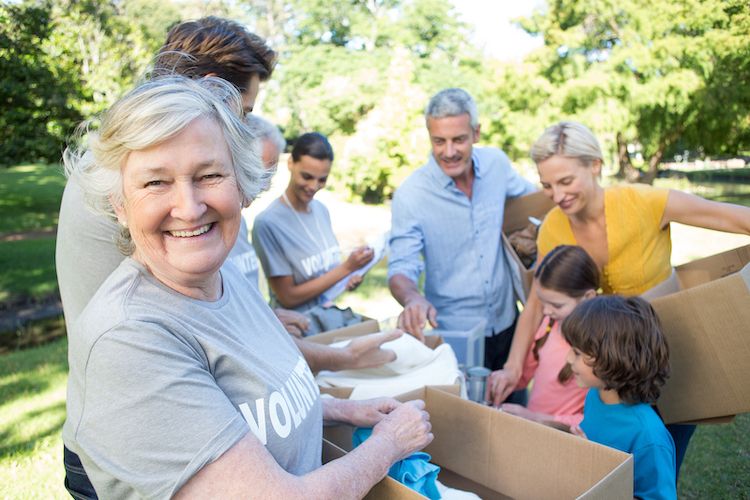How Volunteering Benefits Seniors

Retirement is often referred to as some of the best years of your life, a time when the daily grind is finally over, and the freedom to determine how you will spend your time is completely up to you. For some, the void left by the absence of structured routines and the purpose of the day being mapped out can feel empty and daunting.
As this is a feeling many can relate to, a common remedy seniors find to fill up this new free time is volunteering. Beyond giving back to the community, volunteering serves as a beacon of hope to seek fulfillment in your post-career years. By investing time and skills in meaningful causes, you can contribute to the betterment of society and reap both physical and mental health benefits.
The Physical Advantages of Volunteering for Seniors
Engaging in volunteer work often entails physical activity, whether it be through hands-on tasks or outdoor projects, there will always be an activity that promotes mobility and strength. A study completed by Carnegie Mellon University indicated that older adults who volunteer are less susceptible to hypertension, a major risk factor for cardiovascular diseases like strokes and heart attacks. Volunteering serves as a natural antidote to aging and physical decline associated with advancing years, thanks to the activity you will be able to participate in. Getting out to help the community all while bettering yourself is just one of the ways that volunteering can have an impact on your health.
Managing Health and Wellbeing Through Volunteering
As you navigate retirement and your new sense of purpose, it can often feel lonely. Extra time during the day can result in feeling isolated and a sense of depression. A way to foster this new time is by immersing yourself in volunteer activities. Volunteering can foster social connections with other people your age and a sense of belonging, acting as a buffer against loneliness and depression. The National Library of Medicine suggests that sustained engagement in meaningful endeavors boosts your cognitive response, shielding against the onset of dementia and memory loss. Furthermore, the act of volunteering, benefiting your community, results in psychological well-being, triggering a sense of pride and fulfillment. By nurturing a sense of purpose beyond oneself, you can cultivate a profound sense of self-worth and interconnectedness with the wider community.
Opportunities for Seniors to Learn and Grow
Volunteering fosters a culture of continuous learning and personal growth for seniors. Whether it involves tutoring children, participating in community development projects, or assisting in healthcare settings, you have the opportunity to expand your knowledge and skills in diverse areas. Engaging in volunteer activities can expose you to new challenges and experiences, encouraging you to adapt, problem-solve, and innovate.
This ongoing learning process not only keeps your mind active and agile but also instills a sense of curiosity and openness to new ideas. You may discover hidden talents, explore new interests, or gain fresh perspectives on life through your volunteer work. Additionally, collaborating with people from different backgrounds and generations can broaden your understanding of the world, fostering empathy, tolerance, and cultural awareness. Ultimately, volunteering provides seniors with a platform for lifelong learning and personal development, enriching their lives in meaningful ways.
How Seniors Can Get Involved With Volunteering
As you embark on your volunteer journey, you’ll find a vast array of opportunities awaiting you. Thanks to online platforms like VolunteerMatch and the Retired and Senior Volunteer Program (RSVP), discovering the perfect volunteering fit has never been easier. These platforms act as virtual hubs, seamlessly connecting you with organizations that resonate with your passions, skills, and availability.
Whether you’re keen to mentor the next generation, dedicate your time to environmental conservation efforts, or lend a compassionate hand to those in need, the avenues for contribution are as diverse and plentiful as you are. From local community centers to global initiatives, there’s a volunteer role perfectly suited to your interests and abilities, ensuring that you can find fulfillment and make a meaningful impact in your chosen spheres of service.
Volunteering as a Whole
As you embrace the role of a senior volunteer, you embark on a profound journey of personal growth and fulfillment. Beyond the mere act of service, you can discover a deep sense of purpose and vitality that fills your time with meaning. Through volunteer work, you forge deep and meaningful connections with others and uncover new passions, health benefits, interests, and talents that you may not have explored before. As you contribute your time, skills, and wisdom, you leave an indelible mark on your communities, creating positive change and leaving a legacy of compassion and generosity. Instead of viewing retirement as a time of rest or decline, you find that it is a time for a grand encore—a new chapter filled with boundless possibilities, camaraderie, and the joy of making a difference in the lives of others. By embracing your role as a senior volunteer, you not only enrich the lives of those around you but also rediscover the richness and vibrancy of your own life.
